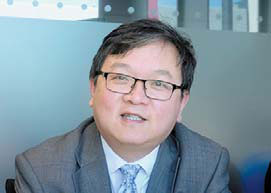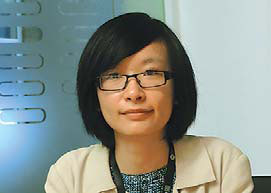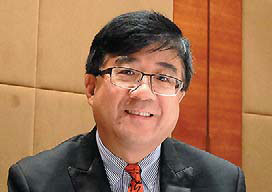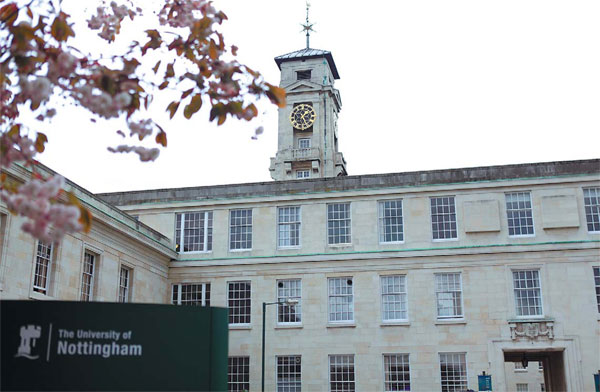Life on the cutting edge in the campus
Updated: 2014-11-21 12:27
By Cecily Liu(China Daily Europe)
|
|||||||||||
Research laboratories in Europe are working with Chinese experts on technology that will be used in many areas, including the home, transport and telecommunications
Chinese companies are increasingly working with universities in Europe to develop cutting-edge technologies as key advantages to compete globally.
This process is also enabling Chinese companies to shift from their previous focus on low-cost manufacturing to concentrate on high-tech, high-value-added growth, contributing to the Chinese economy's structural shift.
Such research collaboration is still limited compared with that between Western companies and universities, but things are changing rapidly.
"An increasing number of Chinese companies have been working with global universities in recent years in research and development, especially private companies," says Guo Yike, a professor in computing science at Imperial College London, who is also director of the university's Data Science Institute.
Since the institute opened in March it has been working with Huawei, the Chinese multinational networking and communications company, to develop new applications in fields including smart cities, information and communications technology and healthcare. That work is done in the college's Huawei Data Science Innovation Laboratory, where Imperial College experts work with Huawei researchers.
"Universities like Imperial are very global in focus," Guo says. "Our international perspective and technology expertise can greatly help Chinese companies become global technology leaders."
Huawei is seen as a highly desirable partner in information and communications technology because it has a supply chain encompassing the three key components of data industries: generation, processing and transfer.
Before the Data Science Institute opened, Huawei also worked with Imperial in joint research with individual professors, mainly on projects in telecommunications, data processing and technology.
The Data Science Institute is doing further work on these projects, data science being an interdisciplinary field of research centered on interpreting datasets. The institute's work spreads across four university faculties: business, engineering, medicine and natural sciences.
Guo says Huawei has provided cloud computing infrastructure for Imperial's researchers, which the university is using a lot for smart city and medical research.
Huawei is also keen on developing technology that can be integrated into smart cities. This is an area of research Imperial has great expertise in, especially as its new campus is also a trial for building the smart-city environment.
Huawei also hopes to develop mobile phone data systems that can process user data for healthcare-related purposes. For example, mobile data is used to monitor users' sleep and physical exercise, and as healthcare equipment, such as a stethoscope, Guo says.
For companies such as Huawei the benefit in working with universities is not just that research results can be commercialized, but also because the process allows them to be at the forefront of technological innovation.
Another university working extensively with Huawei is the University of Surrey, on 5G technology. Huawei is one of the founding partners of the University of Surrey's 5G Innovation Center, opened a year ago. It is investing 5 million pounds ($8 million; 6.3 million euros) in the center and has provided expertise and equipment for large-scale radio access to do research.
The center is the world's first dedicated 5G center and an international hub for telecommunications research and innovation with 5G experimental facilities and specialized laboratories for network testing.
Rahim Tafazolli, head of the center, says Huawei has been a great partner and he is glad it has had the foresight to invest in such technology.
Tong Wen, chief technology officer of Huawei Wireless Networks, says working with university researchers allows Huawei to take part in creating globally recognized 5G industry standards.
"We can also help to commercialize technical academic knowledge."
Huawei's collaboration with the 5G Innovation Center consists of a combination of partnership methods, Tong says, including providing technology, helping to set the center's research direction and focus, and joint research where Huawei's researchers work side by side with researchers.
For example, Huawei will share its own technology for sparse code multiple access to the 5G Innovation Center test bed. SCMA is a technology that can improve spectral efficiency of wireless network, significant for the first phase of the center's test bed.
The outcomes of the center's research will then be shared among all the industry partners including Huawei, Tong says. Others working with the center include: the BBC; the telecommunications companies BT of Britain, Telefonica of Spain and the multinational Vodafone; Britain's telecommunications regulator Ofcom; and Fujitsu Laboratories of Europe.
Worldwide, Huawei is working with 20 universities on 5G R&D, including extensive collaboration in Germany and the UK. Collaboration ranges from partnerships with individual professors to an academic team, depending on the specializations of different universities, Tong says.
Although 5G is a global technology, Tong says Huawei places great importance on the European market because the continent has a strong tradition in setting technological standards.
"Europe's ability to facilitate standardized technologies across diverse countries, its complete technology supply chain and familiarity with the R&D process all contribute to its importance in 5G technology development," Tong says.
Taking part in such research is important because it helps Huawei contribute toward setting the industry standard for 5G technology so that its supply chain can use the same standard for long-term growth, he says.
Huawei knows it takes many years to commercialize R&D results, he says, so the company will continue to invest in 5G research. Academic results on 5G technology are invaluable as foundations for companies such as Huawei to develop consumer-focused technology and products, he says.
At the University of Manchester a 61-million-pound National Graphene Institute is being built, and it has attracted a 5-million-pound collaborative research partnership from Bluestone Global Tech, a major Chinese manufacturer of graphene, a form of carbon used in electronics.
The London School of Hygiene & Tropical Medicine is working with Chinese public health institutions to examine cancer survival. Claudia Allemani, senior lecturer at the school, says this is part of Concord-2, a program involving 279 population-based registries in 67 countries for tracking cases of cancer survival.
Two years ago, Li Ruoran, a research fellow at London School of Hygiene & Tropical Medicine, visited the National Cancer Registration Center at the Chinese Academy of Sciences Cancer Hospital in Beijing to introduce it to the global surveillance program. "It is great that China is involved in such global research," Li says.
The Lancaster University is pioneering a project that brings together Chinese and UK businesses for joint R&D projects in academia, with support of the university's academics and students.
Known as the Lancaster China Catalyst Project, the four-year program started a year ago. It is supported by 5.1 million pounds of funding from the Chinese and UK governments and participating businesses.
David Tyfield, researcher in environmental innovation and sociology at Lancaster University, says this project is uniquely positioned because it encourages Chinese and UK companies to share knowledge and pool in resources for R&D.
The project focuses mainly on small and medium-sized businesses that may otherwise lack the resources to invest in cross-border R&D collaboration.
From the university's perspective it is helpful to have the opportunity to take part in these cutting-edge R&D projects and build up a good relationship with the companies taking part, Tyfield says.
"This may lead to more R&D cooperation with companies in the future. It also enables our research capability to develop and become indispensable to what companies need."
Priority technology areas the project focuses on include advanced manufacturing energy, biotechnology, environmental protection, information and communications technologies, materials, new-vehicle technology and photonics, Tyfield says.
The University of Nottingham has many collaboration projects with Chinese companies, ranging from automotive companies such as Chang'an Automotive and FAW Group to food and drinks company Wahaha and electric locomotives maker CSR Corp Ltd.
Yan Yuying, a professor of thermofluids engineering and head of HVACR (heating, ventilating, and air conditioning) and Heat Transfer Institute at the University of Nottingham, is leading the university's research collaboration efforts with FAW Group.
The research mainly explores technology innovation in hybrid and electrical vehicles, Yan says.
The investigation is concerned with developing a number of technologies, including thermal management and improving thermal efficiency of low-carbon vehicles.
China is a global leader in investing in cutting-edge technology in hybrid and electric vehicles, Yan says, and its efforts in promoting electric vehicles is particularly impressive given that research in electric vehicles may not generate financial benefits immediately.
"Pure electric cars are really a trend of the future. Although much of the technology is still not completely available, a few countries like the US, Europe and Japan are trying to devise major electric cars, and China is one of the leading countries."
Yan says his team is working with FAW to develop thermal management technology for electric vehicles so batteries will operate within the desired temperature range, which will in turn improve safety and prolong battery life.
The battery is the most important and most expensive part of an electric car, accounting for more than half the car's cost, he says.
Chris Gerada, a professor of Electrical Machines at the University of Nottingham, is leading the university's collaboration with several Chinese companies on developing energy-efficient and cost-effective motors that can be applied in many areas, including automotive and white goods.
One partner Gerada's team is working with is Chang'an Automotive. The joint research project focuses on developing energy-efficient and cost-effective motors for electric and hybrid cars.
"Although electrical technology exist, it's not efficient enough and is too expensive," Gerada says. "So we are developing a new type of motor that is more efficient and more cost effective so it can be accessible to the common people."
Chang'an Automotive has opened an R&D center at the university in Nottingham. Discussions started a few years ago, and research began this year.
Another company Gerada's team works with is Shenzhen Nowforever Technology, to develop efficient motors for white goods and industrial motor drive systems.
Gerada says his team does research for the company in both the university's campuses in Nottingham and Ningbo so the two teams can work together according to their respective expertise in the two locations.
The efficient motors Shenzhen Nowforever makes can be used in washing machines, driers and other white goods. The industrial motor drive systems can be used on large industrial projects, Gerada says.
His team in Ningbo also works with the local government on marine economy, in particular developing efficient motors for ships, he says.
In addition, the University of Nottingham has been working closely with China Southern Rolling Stock, a company behind China's high-speed rail. The collaboration focuses on research in electronic devices, including converters, and electrical motor drives, all of which improve the energy efficiency of high-speed rail.
Gerada says working with Chinese companies is attractive to universities because it enables researchers to work with the latest technology and obtain funding for research, and the prestige of the research projects can help universities attract bright students.
cecily.liu@chinadaily.com.cn
|
Guo Yike, a professor in computing science at Imperial College London |
|
Li Ruoran, a research fellow at London School of Hygiene & Tropical Medicine |
|
Rahim Tafazolli, head of the University of Surrey 5G Innovation Center |
|
Tong Wen, chief technology officer of Huawei Wireless Networks |
|
More Chinese enterprises have began working with European universities to develop cutting-edge technologies. Photos by Cecily Liu / China Daily |
(China Daily European Weekly 11/21/2014 page14)
Today's Top News
China wants its voice heard in cyberspace
New standards set for air purifiers
Alipay brings the frenzy of Black Friday to China
US violates China sovereignty in HK
Cyber terrorism sparks Internet debate
Editorial: Mob politics rocks HK
UnionPay offers discounts to outbound tourists
Palace Museum opens door to special groups for free
Hot Topics
Lunar probe , China growth forecasts, Emission rules get tougher, China seen through 'colored lens', International board,
Editor's Picks

|

|

|

|

|

|










